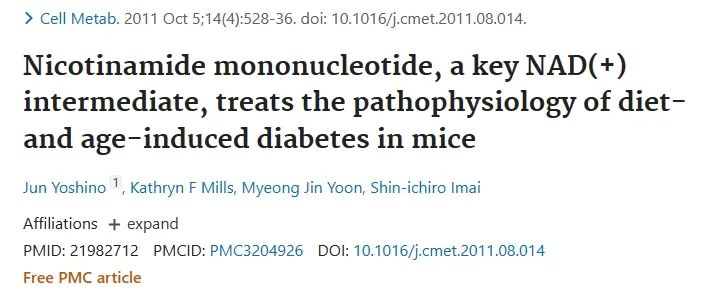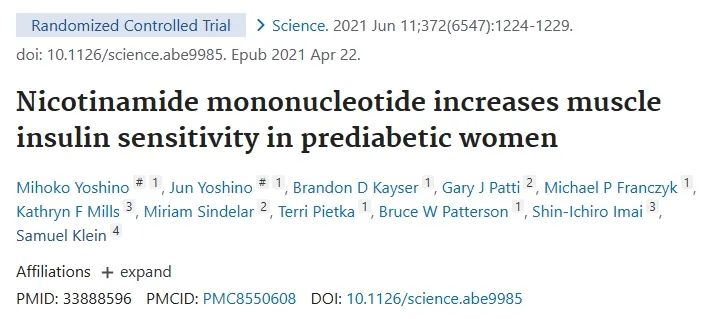
NMN makes insulin "more sensitive"
Diabetes is a metabolic disease characterized by high blood sugar. Long-term high blood sugar can lead to dysfunction of various tissues in the body and cause chronic damage to the body, especially the eyes, kidneys, heart, blood vessels, and nerves.
According to the latest data released by the International Diabetes Federation (IDF), as of 2021, there are approximately 537 million patients worldwide. The number of diabetic patients in my country reaches 141 million, and the incidence rate is as high as 12.8%, which is equivalent to 1 diabetic patient for every 10 people. Among them, more than 90% are type 2 diabetes.
Classification of diabetes
Diabetes is mainly divided into type 1 diabetes, type 2 diabetes, gestational diabetes, abnormal glucose tolerance and abnormal fasting blood glucose.
Type 1 diabetes (formerly called insulin-dependent diabetes or juvenile-onset diabetes) is characterized by insufficient insulin secretion and requires daily insulin infusions.
Type 2 diabetes affects how the body uses sugar (glucose) for energy. It prevents the body from using insulin properly and can cause blood sugar to spike if left untreated. Type 2 diabetes is often preventable.
Gestational diabetes is hyperglycemia in which blood sugar levels during pregnancy are higher than normal but lower than diagnostic values for diabetes.
Impaired glucose tolerance (IGT) and impaired fasting glucose (IFG) refer to an intermediate state between normal and diabetes. People with impaired glucose tolerance or impaired fasting glucose are at higher risk of developing type 2 diabetes, but this is avoidable.
Type 2 diabetes (T2D) has become an epidemic in our modern lifestyle, but because type 2 diabetes is preventable, we can prevent or delay its onset by adjusting our lifestyle. For example, perform moderate exercise every day to reduce excessive obesity and maintain a healthy figure; avoid excessive intake of sugar and saturated fatty acids and maintain a healthy diet; do not smoke and drink less alcohol to maintain a healthy body.
We can also prevent it in other ways, such as taking NMN. So what role can NMN play in preventable type 2 diabetes?
NMN——Treating diet- and age-induced diabetes in mice
Type 2 diabetes has multiple pathogenesis, involving and affecting multiple metabolic pathways, one of which is caused by nicotinamide phosphoribosyltransferase (NAMPT) (the rate-limiting enzyme in mammalian NAD biosynthesis) and NAD-dependent protein deacetylation caused by transformation. Mediated by the SIRT1 enzyme.
Studies have shown that NAMPT-mediated NAD biosynthesis in metabolic organs is severely impaired under the influence of high-fat diet (HFD). Nicotinamide mononucleotide (NMN), a product of the NAMPT reaction and a key NAD intermediate, can improve glucose intolerance by restoring NAD levels in HFD-induced T2D mice. NMN can also enhance hepatic insulin sensitivity and restore gene expression related to oxidative stress, inflammatory response, and circadian rhythms, in part through SIRT1 activation. Furthermore, NAD and NAMPT levels were significantly reduced in multiple organs during aging, and NMN ameliorated glucose and lipid metabolism defects in age-induced T2D mice.

NMN——Improving skeletal muscle insulin sensitivity in prediabetes
In rodents, obesity and aging impair nicotinamide adenine dinucleotide (NAD) biosynthesis, leading to metabolic dysfunction. Nicotinamide mononucleotide (NMN), as the precursor of NAD, is the rate-limiting factor for mammalian NAD biosynthesis. The researchers conducted a 10-week trial using a randomized, double-blind controlled method. To evaluate the effects of NMN supplementation on metabolic function in overweight or obese postmenopausal women with prediabetes. Researchers used hyperinsulinemic-euglycemic clamps to assess insulin-stimulated glucose disposal and skeletal muscle insulin signaling [phosphorylation of protein kinase AKT and mechanistic target of rapamycin (mTOR)] and found that its complementary activity following NMN increased, but did not change treatment after placebo. NMN supplementation upregulates the expression of platelet-derived growth factor receptor beta and other genes related to muscle remodeling.These results indicate that NMN increases muscle insulin sensitivity, insulin signaling, and remodeling in overweight or obese prediabetic women.

As the number of people with diabetes increases in today's society, scientists are also looking for ways to overcome it. Not only is the research on NMN continuing to deepen, more and more research is being initiated, and more and more research is being conducted in depth. We ourselves must also develop good living habits and keep our body and mind happy. Believe in science and believe in yourself.
Post time: Nov-26-2023


